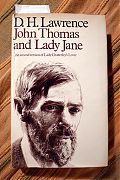
DH Lawrence
John Thomas and Lady Jane
It is nearly impossible for me to think about John Thomas and Lady Jane without comparing it to the final draft, Lady Chatterley’s Lover and the first draft, The First Lady Chatterley. Most notably, this second draft distinguishes itself from its predecessor by the ever developing Constance, Clifford and Parkin/Mellors, while lacking the marked feverishness of its successor. It is DH Lawrence’s middle ground.
No doubt, most of those who decry Lady Chatterley’s Lover for its love scenes and sermons on success and money would prefer John Thomas. For even though the title refers to a scene in Lady Chatterley’s where Mellors’s penis strikes up a conversation with Constance’s vagina, it is absent from this temperate second draft. If one leafs through the pages of John Thomas, it is possible to determine where and what Lawrence was driven to embellish.
The fore embellishments, besides more graphic sex, are of Clifford and Parkin/Mellors. In John Thomas, both of these men do not cling to their ideas as strongly as they do in the final. Instead, they are especial representatives of their respective class, working or gentry, and more interesting in their relationship to Constance Chatterley. For the relationships are the point here, as is the dialogue between the will and the sensual body. Again and again Lawrence returns to the self-driven will and its chafing away at the sensual, passionate body, or touch.
Fight one does and must, against the enemies of life. But when you come to life itself, you must come as the flower does, naked and defenseless and infinitely in touch.
Unlike the Constance of The First Lady Chatterley, she is no longer a “modern” woman unable to open completely to Parkin. Instead, she acquiescences to Parkin near the beginning when she first comes in sight of his “white, firm, divine body, with its silky ripple, the white arch of life.” She wonders about his touch. Occasionally Constance is stricken with bouts of self-doubt, understandable under the knowledge of what a total convergence to Parkin implies. And unlike the final text, there are fewer sharp back-and-forths of feelings for Parkin or Clifford, resulting in a steadier climax away from the will of Clifford and towards the touch of Parkin.
Events and alterations of characters move along more simply, as well as steadily, in John Thomas. Clifford’s abstract will is satisfied in his success at work and his manipulation of Mrs. Bolton. While Parkin, the man of isolation, stands apart from his peers for no reason but that’s the way he is; Parkin has no thoughts of the future, no political leaning and his only grudge against the world is that it won’t allow him and Constance to be alone in the wood. Parkin is more stable, more tender, more understanding and forgiving.
Parkin says: “I’m not like the other chaps: I’m miserable when I can’t be myself. My mother allers said as I was on’y ha’ef a man.”
While Mellors says much more surely: “I stand for the touch of bodily awareness between human beings, and the touch of tenderness.”
Standing for anything does not occur to Parkin. Yet despite not being bookish like Mellors, he is not dumb, for without saying it, he also stands for the “touch of tenderness,” for the sensual, passionate body.
The ending of John Thomas and Lady Jane is in the middle of the three drafts, a combination. Clifford never learns of Constance’s pregnancy and Duncan Forbes only makes a brief appearance; the conclusion is only between Constance and Parkin, complicated by more people in the other two drafts. It is a compromise between them, but it is also slightly ambiguous. They must create the world in which their touch can exist together, but we don’t know if that world will flourish.
I’m afraid I’m temporarily putting an end to these last months of Lady Chatterley and her lover, albeit with hesitation. The immersion into the texts has been gratifying, but it is also enjoyable to be out again. Yet, how much have I emerged when I pick up Thomas Hardy, a writer Lawrence greatly admired?
John Thomas says good-night to lady Jane, a little droopingly, but with a hopeful heart— (from Lady Chatterley’s Lover)
· · · · · · · · · · · · · · · · · · · ·